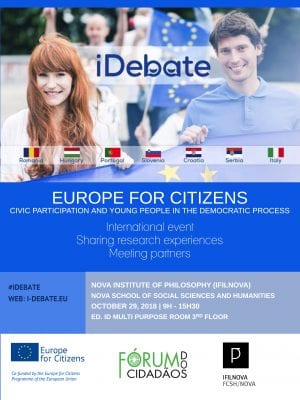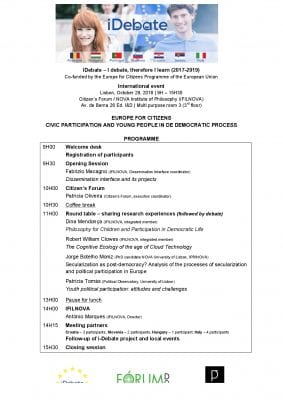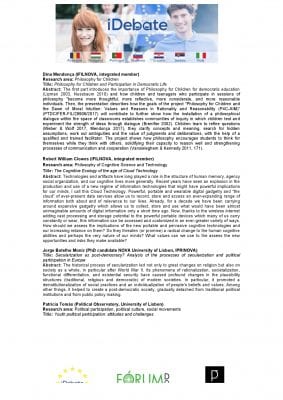iDebate – I debate, therefore I learn (2017-2019)
Co-finanțat de programul “Europa pentru cetățeni” al Uniunii Europene
Eveniment internațional
Lisabona, Octombrie 29, 2018 | 9H – 15H30 (11H – 17H30, ora Romaniei)
Citizen’s Forum / NOVA Institute of Philosophy (IFILNOVA)
CIVIC PARTICIPATION AND YOUNG PEOPLE IN THE DEMOCRATIC PROCESS
PARTICIPAREA CIVICĂ ȘI TINERII ÎN PROCESUL DEMOCRATIC
Cel de-al treilea eveniment international al proiectului iDebate, implementat de Fundatia Student Plus – Centrul de informare Europe Direct Timișoara și partenerii internaționali va fi transmis LIVE pe pagina de facebook a proiectului iDebate. Prezentările și dialogul se vor desfășura în limba engleză.
Va invităm să ne urmăriți, începând cu ora 11.00, ora României.
Între distinșii invitați : Dina Mendonça (IFILNOVA), Robert William Clowes (IFILNOVA), Jorge Botelho Moniz (doctorand Universitatea NOVA Lisabona, IPRINOVA), Patrícia Tomás (Observator politic al Universității din Lisabona).
Temele deosebit de interesante propuse de partenerii portughezi sunt:
– Ecologia cognitivă în era tehnologiei cloud
– Atitudini și provocări ale participarii tinerilor la viata politică
– Educația filosofică la copii și participarea la viața democratică
– Secularizarea ca post-democrație? O analiză a procesului de secularizare și a participării politice în Europa
PROGRAM
| 9H00 | Welcome desk Registration of participants |
| 9H30 | Opening Session Fabrizio Macagno (IFILNOVA, Dissemination Interface coordinator) Dissemination interface and its projects |
| 10H00 | Citizen’s Forum Patrícia Oliveira (Citizen’s Forum, executive coordinator) |
| 10H30 | Coffee break |
| 11H00 | Round table – sharing research experiences (followed by debate) Dina Mendonça (IFILNOVA, integrated member) Philosophy for Children and Participation in Democratic Life Robert William Clowes (IFILNOVA, integrated member) The Cognitive Ecology of the age of Cloud Technology Jorge Botelho Moniz (PhD candidate NOVA University of Lisbon, IPRINOVA) Secularization as post-democracy? Analysis of the processes of secularization and political participation in Europe Patrícia Tomás (Political Observatory, University of Lisbon) Youth political participation: attitudes and challenges |
| 13H00 | Pause for lunch |
| 14H00 | IFILNOVA
António Marques (IFILNOVA, Director) |
| 14H15 | Meeting partners |
| 15H30 | Closing session |
Dina Mendonça (IFILNOVA, integrated member)
Research area: Philosophy for Children
Title: Philosophy for Children and Participation in Democratic Life
Abstract: The first part introduces the importance of Philosophy for Children for democratic education (Lipman 2003, Nussbaum 2010) and how children and teenagers who participate in sessions of philosophy “become more thoughtful, more reflective, more considerate, and more reasonable individuals. Then, the presentation describes how the goals of the project “Philosophy for Children and the Dawn of Moral Intuition: Values and Reasons in Rationality and Reasonability (P4C-AIM)” (PTDC/FER-FIL/29906/2017) will contribute to further show how the installation of a philosophical dialogue within the space of classrooms establishes communities of inquiry in which children test and experiment the strength of ideas through dialogue (Brenifier 2002). Children learn to refine questions (Weber & Wolf 2017, Mendonça 2017), they clarify concepts and meaning, search for hidden assumptions, work out ambiguities and the value of judgments and deliberations, with the help of a qualified and trained facilitator. The project shows how philosophy encourages students to think for themselves while they think with others, solidifying their capacity to reason well and strengthening processes of communication and cooperation (Vansieleghem & Kennedy 2011, 171).
Robert William Clowes (IFILNOVA, integrated member)
Research area: Philosophy of Cognitive Science and Technology
Title: The Cognitive Ecology of the age of Cloud Technology
Abstract: Technologies and artifacts have long played a role in the structure of human memory, agency social organization, and our cognitive lives more generally. Recent years have seen an explosion in the production and use of a new regime of information technologies that might have powerful implications for our minds. I call this Cloud Technology. Powerful, portable and wearable digital gadgetry and “the cloud” of ever-present data services allow us to record, store and access an ever-expanding range of information both about and of relevance to our lives. Already, for a decade we have been carrying around expansive gadgetry which allows us to collect, store and use what would have been almost unimaginable amounts of digital information only a short time ago. Now, thanks to the wireless internet adding vast processing and storage potential to the powerful portable devices which many of us carry constantly or wear, this information can be accessed and customized in an ever-greater variety of ways.
How should we assess the implications of the new portable and pervasive cognitive technologies and our increasing reliance on them? Do they threaten (or promise) a radical change to the human cognitive abilities and perhaps the very nature of our minds? What values can we use to the assess the new opportunities and risks they make available?
Jorge Botelho Moniz (PhD candidate NOVA University of Lisbon, IPRINOVA)
Title: Secularization as post-democracy? Analysis of the processes of secularization and political participation in Europe
Abstract: The historical process of secularization led not only to great changes on religion but also on society as a whole, in particular after World War II. Its phenomena of rationalization, societalization, functional differentiation, and existential security have caused profound changes in the plausibility structures (traditional, religious and democratic) of modern societies. In particular, it promoted a deinstitutionalization of social practices and an individualization of people’s beliefs and values. Among other things, it helped to create a post-democratic society, gradually detached from traditional political institutions and from public policy making.
Patrícia Tomás (Political Observatory, University of Lisbon)
Research area: Political participation, political culture, social movements
Title: Youth political participation: attitudes and challenges
LINK-uri utile:
Site-ul web al proiectului iDebate
Arhiva video a proiectului iDebate
Sursa: Comunicat iDebate – Forum dos Cidadados





